List of counties in Wisconsin facts for kids
Quick facts for kids Counties of Wisconsin |
|
|---|---|
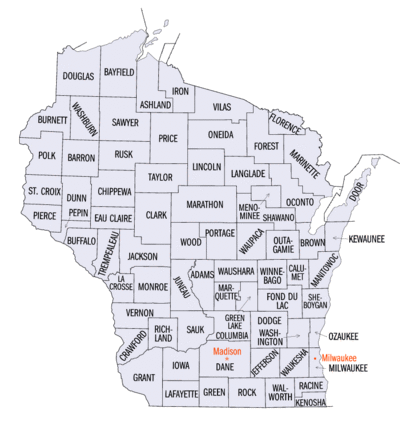 |
|
| Location | State of Wisconsin |
| Number | 72 |
| Populations | 4,226 (Menominee) – 916,205 (Milwaukee) |
| Areas | 231.98 square miles (600.8 km2) (Pepin) – 1,544.91 square miles (4,001.3 km2) (Marathon) |
| Government | County government |
| Subdivisions | cities, villages, towns |
Wisconsin has 72 special areas called counties. Think of them like smaller regions within the state, each with its own local government.
Long ago, the land that is now Wisconsin belonged to the British. After the Revolutionary War, in 1783, it became part of the United States. For a while, it was an unorganized area. Then, in 1802, it became part of a very large county called St. Clair County.
When Illinois became a state in 1818, Wisconsin became part of the Michigan Territory. It was divided into two main counties: Brown County in the northeast and Crawford County in the southwest. Over time, more counties were created from these original ones. For example, Iowa County was formed in 1829, and Milwaukee County was created in 1834. When Wisconsin officially became a state on May 29, 1848, it had 28 counties.
Today, the county with the most people is Milwaukee County, with over 916,000 residents. The smallest county by population is Menominee County, which has about 4,200 people. This county is also home to the Menominee Indian Reservation. In terms of size, Pepin County is the smallest, covering about 232 square miles. The largest county is Marathon County, which is about 1,545 square miles.
The United States government uses a special code called the Federal Information Processing Standard (FIPS) code to identify each state and county. Wisconsin's code is 55. So, for any county in Wisconsin, its FIPS code starts with 55, followed by a unique three-digit number. These codes help link to important information like census data for each county.
Contents
How Counties are Governed
Each county in Wisconsin has a main town or city called a county seat. This is usually a busy place or one that's easy to reach for everyone in the county. The county government offices are located here.
Counties provide many important services for their residents, such as:
- Keeping law and order with sheriffs and police.
- Running courts to handle legal cases.
- Offering social services to help families and individuals.
- Keeping important records like birth certificates and property deeds.
- Maintaining roads and clearing snow in winter.
County officials, like sheriffs, district attorneys, and treasurers, are elected by the people for four-year terms. In many counties, medical examiners now handle duties that coroners used to do.
Counties in Wisconsin are managed by groups called county boards. These boards are led by a chairperson. Larger counties, with 500,000 people or more, also have a county executive. Smaller counties might have a county executive or a county administrator to help run things. As of 2011, 13 counties had elected county executives, and many others had appointed administrators or coordinators.
List of Counties
| County |
FIPS code | County seat | Est. | Formed from | Etymology | Population | Area | Map |
|---|---|---|---|---|---|---|---|---|
| Adams County | 001 | Friendship | 1848 | Portage County | John Quincy Adams (1767–1848), President of the United States (1825–29) | 21,449 | 645.65 sq mi (1,672 km2) |
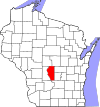 |
| Ashland County | 003 | Ashland | 1860 | La Pointe County | Ashland, Henry Clay's estate in Kentucky | 16,079 | 1,045.04 sq mi (2,707 km2) |
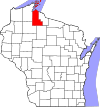 |
| Barron County | 005 | Barron | 1859 | Polk County | Henry D. Barron, state senator and circuit court judge. | 46,833 | 862.71 sq mi (2,234 km2) |
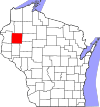 |
| Bayfield County | 007 | Washburn | 1845 | St. Croix County | Henry Bayfield, Royal naval officer and first to survey Great Lakes area | 16,769 | 1,477.86 sq mi (3,828 km2) |
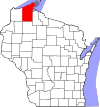 |
| Brown County | 009 | Green Bay | 1818 | unorganized territory | Major General Jacob Brown (1775–1828), commanding general of the United States Army during the War of 1812 | 271,417 | 529.71 sq mi (1,372 km2) |
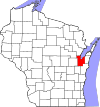 |
| Buffalo County | 011 | Alma | 1853 | Jackson County | The Buffalo River, which flows through the county. | 13,419 | 671.64 sq mi (1,740 km2) |
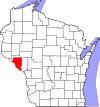 |
| Burnett County | 013 | Siren | 1856 | Polk County | Thomas P. Burnett, state legislator | 17,092 | 821.85 sq mi (2,129 km2) |
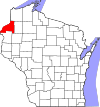 |
| Calumet County | 015 | Chilton | 1836 | Brown County, Wisconsin | The French word for a Menominee Ceremonial pipe. | 53,199 | 318.24 sq mi (824 km2) |
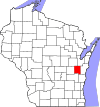 |
| Chippewa County | 017 | Chippewa Falls | 1845 | Crawford County | Chippewa Indians | 66,970 | 1,008.37 sq mi (2,612 km2) |
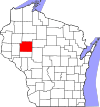 |
| Clark County | 019 | Neillsville | 1853 | Crawford County | George Rogers Clark (1752–1812), Revolutionary War general | 34,774 | 1,209.82 sq mi (3,133 km2) |
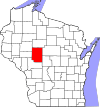 |
| Columbia County | 021 | Portage | 1846 | Portage County | Christopher Columbus (1451–1506), navigator and explorer | 58,091 | 765.53 sq mi (1,983 km2) |
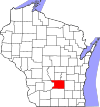 |
| Crawford County | 023 | Prairie du Chien | 1818 | unorganized territory | William Harris Crawford (1772–1834), United States Senator from Georgia (1807–13) and Secretary of the Treasury (1816–25) | 15,944 | 570.66 sq mi (1,478 km2) |
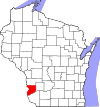 |
| Dane County | 025 | Madison | 1836 | Crawford, Iowa, and Milwaukee Countes | Nathan Dane (1752–1835), delegate to the First Continental Congress (1785–88) | 575,347 | 1,197.24 sq mi (3,101 km2) |
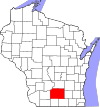 |
| Dodge County | 027 | Juneau | 1836 | Brown and Milwaukee Counties | Henry Dodge (1782–1867), Territorial Governor of Wisconsin (1845–48) | 88,231 | 875.63 sq mi (2,268 km2) |
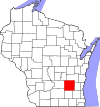 |
| Door County | 029 | Sturgeon Bay | 1851 | Brown County | A dangerous water passage near Door Peninsula known as Porte des Morts or "door of the dead" in French | 30,562 | 481.98 sq mi (1,248 km2) |
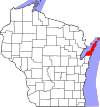 |
| Douglas County | 031 | Superior | 1854 | La Pointe County | Stephen Douglas (1813–61), United States Senator from Illinois (1847–61) | 44,264 | 1,304.14 sq mi (3,378 km2) |
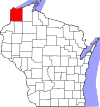 |
| Dunn County | 033 | Menomonie | 1854 | Chippewa County | Charles Dunn, state senator and chief justice of Wisconsin Territory | 45,794 | 850.11 sq mi (2,202 km2) |
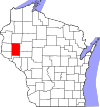 |
| Eau Claire County | 035 | Eau Claire | 1856 | Chippewa County | City of Eau Claire French for "clear water" | 107,903 | 637.98 sq mi (1,652 km2) |
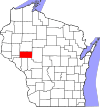 |
| Florence County | 037 | Florence | 1881 | Marinette and Oconto Counties | Florence Hulst, the first white woman to settle in the area | 4,682 | 488.20 sq mi (1,264 km2) |
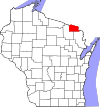 |
| Fond du Lac County | 039 | Fond du Lac | 1836 | Brown County | French for "bottom of the lake" | 103,948 | 719.55 sq mi (1,864 km2) |
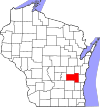 |
| Forest County | 041 | Crandon | 1885 | Langlade and Oconto Counties | Forest which covered the area when it was settled | 9,325 | 1,014.07 sq mi (2,626 km2) |
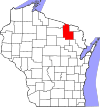 |
| Grant County | 043 | Lancaster | 1837 | Iowa County | Probably a trader named Grant who made contact with area natives in 1810 but about whom little else is known | 51,409 | 1,146.85 sq mi (2,970 km2) |
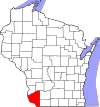 |
| Green County | 045 | Monroe | 1837 | Iowa County and unorganized territory | Nathanael Greene (1742–86), quartermaster general during the American Revolutionary War | 36,951 | 583.96 sq mi (1,512 km2) |
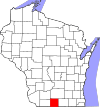 |
| Green Lake County | 047 | Green Lake | 1858 | Marquette County | Green Lake located within the county | 19,344 | 349.44 sq mi (905 km2) |
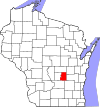 |
| Iowa County | 049 | Dodgeville | 1829 | Crawford County | Iowa tribe of Indians | 23,956 | 762.58 sq mi (1,975 km2) |
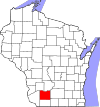 |
| Iron County | 051 | Hurley | 1893 | Ashland and Oneida Counties | Local iron deposits | 6,228 | 758.17 sq mi (1,964 km2) |
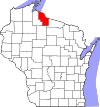 |
| Jackson County | 053 | Black River Falls | 1853 | La Crosse County | Andrew Jackson (1767–1845), President of the United States (1829–37) | 20,855 | 987.72 sq mi (2,558 km2) |
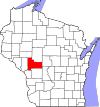 |
| Jefferson County | 055 | Jefferson | 1836 | Milwaukee County | Thomas Jefferson (1743–1826), President of the United States (1801–09) | 85,743 | 556.47 sq mi (1,441 km2) |
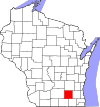 |
| Juneau County | 057 | Mauston | 1856 | Adams County | Solomon Juneau (1793–1856), founder of what would become Milwaukee | 26,594 | 766.93 sq mi (1,986 km2) |
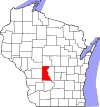 |
| Kenosha County | 059 | Kenosha | 1850 | Racine County | Indian word meaning "place of the pike" | 167,488 | 271.99 sq mi (704 km2) |
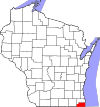 |
| Kewaunee County | 061 | Kewaunee | 1852 | Door County | Either a Potawatomi word meaning "river of the lost" or an Ojibwe word meaning "prairie hen" "wild duck" or "to go around" | 20,690 | 342.52 sq mi (887 km2) |
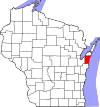 |
| La Crosse County | 063 | La Crosse | 1851 | Crawford County | Indian game of lacrosse | 120,486 | 451.69 sq mi (1,170 km2) |
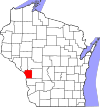 |
| Lafayette County | 065 | Darlington | 1846 | Iowa County | Gilbert du Motier marquis de La Fayette (1757–1834), a French general in the American Revolutionary War | 16,945 | 633.59 sq mi (1,641 km2) |
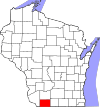 |
| Langlade County | 067 | Antigo | 1879 | Oconto County | Charles de Langlade (1729 – c. 1800), American Revolutionary War veteran and United States Indian Agent in Green Bay | 19,404 | 870.64 sq mi (2,255 km2) |
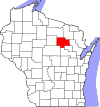 |
| Lincoln County | 069 | Merrill | 1874 | Marathon County | Abraham Lincoln (1809–65), President of the United States (1861–65) | 28,405 | 878.97 sq mi (2,277 km2) |
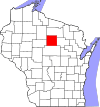 |
| Manitowoc County | 071 | Manitowoc | 1836 | Brown County | Munedoo-owk, an Ojibwe word meaning "the place of the good spirit" | 81,331 | 589.08 sq mi (1,526 km2) |
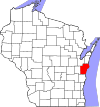 |
| Marathon County | 073 | Wausau | 1850 | Portage County | Marathon, Greece | 138,612 | 1,544.98 sq mi (4,001 km2) |
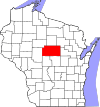 |
| Marinette County | 075 | Marinette | 1879 | Oconto County | Marie Antoinette Chevalier, Indian wife of an early fur trapper | 42,106 | 1,399.35 sq mi (3,624 km2) |
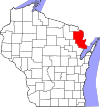 |
| Marquette County | 077 | Montello | 1836 | Brown County | Jacques Marquette (1637–75), missionary and explorer | 15,838 | 455.60 sq mi (1,180 km2) |
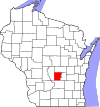 |
| Menominee County | 078 | Keshena | 1959 | Menominee Indian Reservation, Shawano, and Oconto Counties | Menominee Indians | 4,226 | 357.61 sq mi (926 km2) |
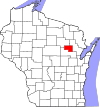 |
| Milwaukee County | 079 | Milwaukee | 1834 | Brown County | Mahnawaukee-Seepe, an Indian word meaning "gathering place by the river" | 916,205 | 241.40 sq mi (625 km2) |
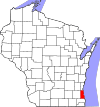 |
| Monroe County | 081 | Sparta | 1854 | La Crosse County | James Monroe (1758–1831), President of the United States (1817–25) | 46,151 | 900.78 sq mi (2,333 km2) |
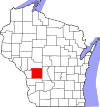 |
| Oconto County | 083 | Oconto | 1851 | Brown County | An Indian settlement and the Oconto River, whose name means "plentiful with fish" | 39,775 | 997.99 sq mi (2,585 km2) |
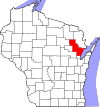 |
| Oneida County | 085 | Rhinelander | 1885 | Lincoln County | Oneida Indians | 38,226 | 1,112.97 sq mi (2,883 km2) |
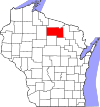 |
| Outagamie County | 087 | Appleton | 1851 | Brown County | Outagamie Indians | 193,234 | 637.52 sq mi (1,651 km2) |
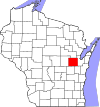 |
| Ozaukee County | 089 | Port Washington | 1853 | Washington County | The Ojibwe word for the Sauk nation | 93,460 | 233.08 sq mi (604 km2) |
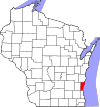 |
| Pepin County | 091 | Durand | 1858 | Dunn County | Pierre and Jean Pepin du Chardonnets, explorers | 7,441 | 231.98 sq mi (601 km2) |
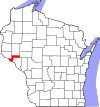 |
| Pierce County | 093 | Ellsworth | 1853 | Saint Croix County | Franklin Pierce (1804–69), President of the United States (1853–57) | 43,026 | 573.75 sq mi (1,486 km2) |
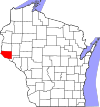 |
| Polk County | 095 | Balsam Lake | 1853 | Saint Croix County | James Polk (1795–1849), President of the United States (1845–49) | 45,762 | 913.96 sq mi (2,367 km2) |
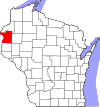 |
| Portage County | 097 | Stevens Point | 1836 | Brown, Crawford, Iowa, and Milwaukee Counties | Passage between the Fox and Wisconsin Rivers | 71,024 | 800.68 sq mi (2,074 km2) |
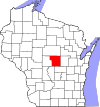 |
| Price County | 099 | Phillips | 1879 | Chippewa and Lincoln Counties | William T. Price (1824–86), Representative from Wisconsin (1883–86) | 14,102 | 1,254.38 sq mi (3,249 km2) |
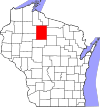 |
| Racine County | 101 | Racine | 1836 | Milwaukee County | Racine, the French word for "root", after the Root River, which flows through the county | 196,613 | 332.5 sq mi (861 km2) |
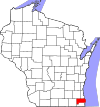 |
| Richland County | 103 | Richland Center | 1842 | Iowa County | The rich soil of the area | 17,197 | 586.15 sq mi (1,518 km2) |
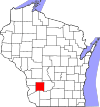 |
| Rock County | 105 | Janesville | 1836 | Milwaukee County | Rock River, which flows through the county | 164,278 | 718.14 sq mi (1,860 km2) |
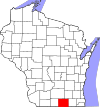 |
| Rusk County | 107 | Ladysmith | 1901 | Chippewa County | Jeremiah McLain Rusk (1830–93), Governor of Wisconsin (1882–89) | 14,143 | 913.59 sq mi (2,366 km2) |
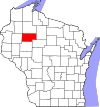 |
| Sauk County | 111 | Baraboo | 1840 | Crawford, Dane and Portage Counties | Sauk Indians | 65,920 | 830.9 sq mi (2,152 km2) |
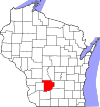 |
| Sawyer County | 113 | Hayward | 1883 | Ashland and Chippewa Counties | Philetus Sawyer (1816–1900), Representative (1865–75) and Senator (1881–93) from Wisconsin | 18,552 | 1,257.31 sq mi (3,256 km2) |
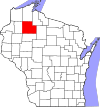 |
| Shawano County | 115 | Shawano | 1853 | Oconto County | An Ojibwe word meaning "southern" | 41,109 | 893.06 sq mi (2,313 km2) |
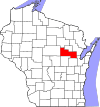 |
| Sheboygan County | 117 | Sheboygan | 1836 | Brown County | Shawb-wa-way-kun, an Indian word meaning "great noise underground" | 117,752 | 511.27 sq mi (1,324 km2) |
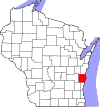 |
| St. Croix County | 109 | Hudson | 1840 | Crawford County, and unorganized territory | An early French explorer named St. Croix, about whom little is known | 96,763 | 722.33 sq mi (1,871 km2) |
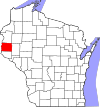 |
| Taylor County | 119 | Medford | 1875 | Clark, Lincoln, Marathon and Chippewa Counties | William Robert Taylor (1820–1909), Governor of Wisconsin 1874–76 | 20,058 | 974.88 sq mi (2,525 km2) |
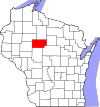 |
| Trempealeau County | 121 | Whitehall | 1854 | Buffalo, Chippewa, Jackson, and La Crosse Counties | Trempealeau Mountain (from the French for "mountain with its foot in the water"), a bluff located in a bend of the Trempealeau River, which flows through the county | 30,899 | 732.97 sq mi (1,898 km2) |
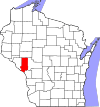 |
| Vernon County | 123 | Viroqua | 1851 | Richland and Crawford Counties | Mount Vernon, home of George Washington | 31,170 | 791.58 sq mi (2,050 km2) |
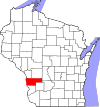 |
| Vilas County | 125 | Eagle River | 1893 | Oneida County | William Vilas (1840–1908), officer in the Civil War United States Postmaster General (1885–88) United States Secretary of the Interior (1888–89) and Senator from Wisconsin (1891–97) | 23,885 | 856.60 sq mi (2,219 km2) |
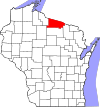 |
| Walworth County | 127 | Elkhorn | 1836 | Milwaukee County | Reuben Hyde Walworth (1788–1867), jurist from New York | 105,822 | 555.13 sq mi (1,438 km2) |
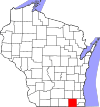 |
| Washburn County | 129 | Shell Lake | 1883 | Burnett County | Cadwallader Washburn (1818–82), Governor (1872–74) and Representative from Wisconsin (1867–71) | 16,930 | 797.11 sq mi (2,065 km2) |
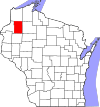 |
| Washington County | 131 | West Bend | 1836 | Brown and Milwaukee Counties | George Washington (1732–99), American Revolutionary War leader (1775–83) and first President of the United States (1789–97) | 138,168 | 430.70 sq mi (1,116 km2) |
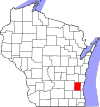 |
| Waukesha County | 133 | Waukesha | 1846 | Milwaukee County | Waugooshance, a Pottawatomi word meaning "little foxes" | 412,591 | 549.57 sq mi (1,423 km2) |
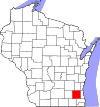 |
| Waupaca County | 135 | Waupaca | 1851 | Brown and Winnebago Counties | wau-pa-ka-ho-nak, a Menominee word meaning "white sand bottom" or "brave young hero" | 51,388 | 747.71 sq mi (1,937 km2) |
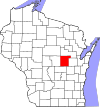 |
| Waushara County | 137 | Wautoma | 1851 | Marquette County | An Indian word meaning "good earth" | 24,934 | 626.15 sq mi (1,622 km2) |
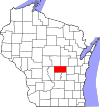 |
| Winnebago County | 139 | Oshkosh | 1840 | Brown, Calumet, and Fond du Lac Counties | Winnebago Indians | 171,735 | 434.49 sq mi (1,125 km2) |
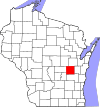 |
| Wood County | 141 | Wisconsin Rapids | 1856 | Portage County | Joseph Wood (1809–90), state legislator (1856–58) | 73,939 | 793.12 sq mi (2,054 km2) |
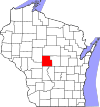 |
Counties That Changed Names
Five counties in Wisconsin have changed their names over time, but their borders stayed the same.
- Bad Axe County existed from 1851 to 1862. It was named after the Bad Axe River and a battle. It was later renamed Vernon County.
- Dallas County was around for 10 years, from 1859 to 1869. It was named after George M. Dallas, who was the 11th Vice President of the United States. It became Barron County.
- Gates County existed from 1901 to 1905. It was named after a land investor. This county was renamed Rusk County.
- La Pointe County existed from 1845 to 1866. When Wisconsin became a state in 1848, La Pointe County was split between Wisconsin and Minnesota. It was renamed Bayfield County.
- New County existed for a short time between 1879 and 1880. It was formed from part of Oconto County and was quickly renamed Langlade County.
Counties That Were Planned But Not Created
Sometimes, new counties are suggested but never actually formed. Here are two examples in Wisconsin:
- In 1850, there was a plan for a new county called Tuskola County. It would have been created from parts of Washington County. The area it would have covered is now within Washington and Ozaukee counties.
- In 1997, a county called Century County was suggested. The idea was to combine Wood, Clark, and Marathon counties after the year 2000. It was meant to be a "new county for a new century." This idea came up again in 2012 due to issues with sand mining in the area.
See also
 In Spanish: Anexo:Condados de Wisconsin para niños
In Spanish: Anexo:Condados de Wisconsin para niños
- BOW counties
- WOW counties
- Political subdivisions of Wisconsin
- List of cities in Wisconsin
- List of villages in Wisconsin
- List of towns in Wisconsin
 | Toni Morrison |
 | Barack Obama |
 | Martin Luther King Jr. |
 | Ralph Bunche |

